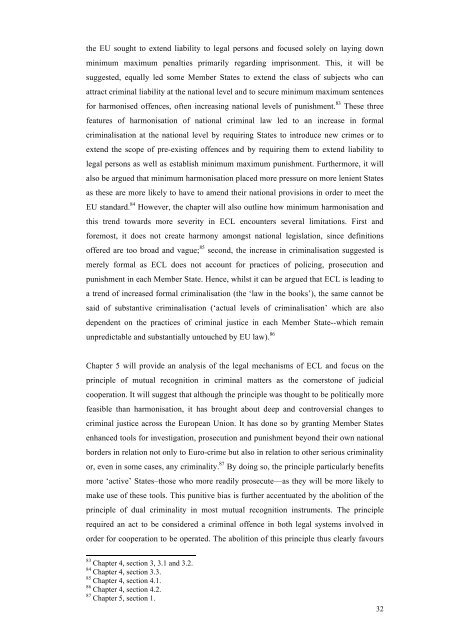The evolution of European Union criminal law (1957-2012)
The evolution of European Union criminal law (1957-2012)
The evolution of European Union criminal law (1957-2012)
Create successful ePaper yourself
Turn your PDF publications into a flip-book with our unique Google optimized e-Paper software.
the EU sought to extend liability to legal persons and focused solely on laying down<br />
minimum maximum penalties primarily regarding imprisonment. This, it will be<br />
suggested, equally led some Member States to extend the class <strong>of</strong> subjects who can<br />
attract <strong>criminal</strong> liability at the national level and to secure minimum maximum sentences<br />
for harmonised <strong>of</strong>fences, <strong>of</strong>ten increasing national levels <strong>of</strong> punishment. 83 <strong>The</strong>se three<br />
features <strong>of</strong> harmonisation <strong>of</strong> national <strong>criminal</strong> <strong>law</strong> led to an increase in formal<br />
<strong>criminal</strong>isation at the national level by requiring States to introduce new crimes or to<br />
extend the scope <strong>of</strong> pre-existing <strong>of</strong>fences and by requiring them to extend liability to<br />
legal persons as well as establish minimum maximum punishment. Furthermore, it will<br />
also be argued that minimum harmonisation placed more pressure on more lenient States<br />
as these are more likely to have to amend their national provisions in order to meet the<br />
EU standard. 84 However, the chapter will also outline how minimum harmonisation and<br />
this trend towards more severity in ECL encounters several limitations. First and<br />
foremost, it does not create harmony amongst national legislation, since definitions<br />
<strong>of</strong>fered are too broad and vague; 85 second, the increase in <strong>criminal</strong>isation suggested is<br />
merely formal as ECL does not account for practices <strong>of</strong> policing, prosecution and<br />
punishment in each Member State. Hence, whilst it can be argued that ECL is leading to<br />
a trend <strong>of</strong> increased formal <strong>criminal</strong>isation (the ‘<strong>law</strong> in the books’), the same cannot be<br />
said <strong>of</strong> substantive <strong>criminal</strong>isation (‘actual levels <strong>of</strong> <strong>criminal</strong>isation’ which are also<br />
dependent on the practices <strong>of</strong> <strong>criminal</strong> justice in each Member State--which remain<br />
unpredictable and substantially untouched by EU <strong>law</strong>). 86<br />
Chapter 5 will provide an analysis <strong>of</strong> the legal mechanisms <strong>of</strong> ECL and focus on the<br />
principle <strong>of</strong> mutual recognition in <strong>criminal</strong> matters as the cornerstone <strong>of</strong> judicial<br />
cooperation. It will suggest that although the principle was thought to be politically more<br />
feasible than harmonisation, it has brought about deep and controversial changes to<br />
<strong>criminal</strong> justice across the <strong>European</strong> <strong>Union</strong>. It has done so by granting Member States<br />
enhanced tools for investigation, prosecution and punishment beyond their own national<br />
borders in relation not only to Euro-crime but also in relation to other serious <strong>criminal</strong>ity<br />
or, even in some cases, any <strong>criminal</strong>ity. 87 By doing so, the principle particularly benefits<br />
more ‘active’ States–those who more readily prosecute—as they will be more likely to<br />
make use <strong>of</strong> these tools. This punitive bias is further accentuated by the abolition <strong>of</strong> the<br />
principle <strong>of</strong> dual <strong>criminal</strong>ity in most mutual recognition instruments. <strong>The</strong> principle<br />
required an act to be considered a <strong>criminal</strong> <strong>of</strong>fence in both legal systems involved in<br />
order for cooperation to be operated. <strong>The</strong> abolition <strong>of</strong> this principle thus clearly favours<br />
83 Chapter 4, section 3, 3.1 and 3.2.<br />
84 Chapter 4, section 3.3.<br />
85 Chapter 4, section 4.1.<br />
86 Chapter 4, section 4.2.<br />
87 Chapter 5, section 1.<br />
32
















